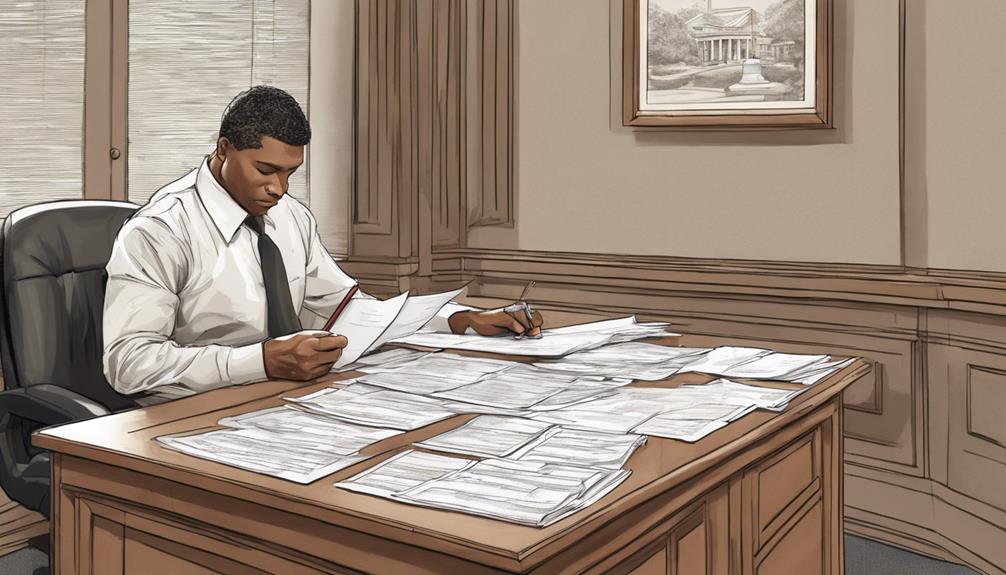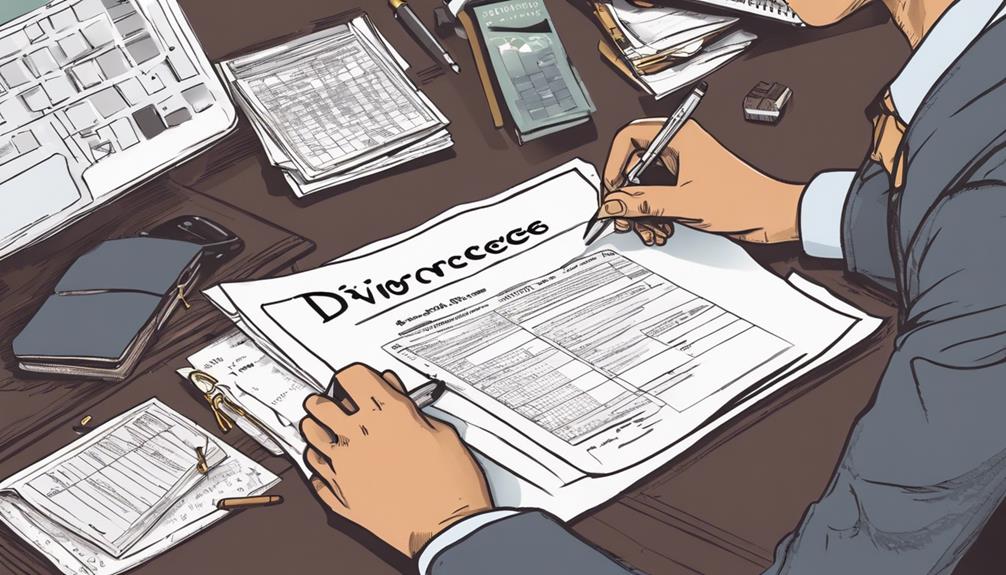Have you ever questioned the feasibility of finding a divorce attorney without any extra funds available?
The journey to securing legal assistance during a divorce can be daunting, especially when finances are tight. However, there are practical steps that can be taken to navigate this challenging situation.
By exploring innovative strategies and available resources, individuals can find solutions that may offer a glimmer of hope in an otherwise difficult time.
Key Takeaways
- Explore free or low-cost legal aid options through organizations and bar associations.
- Utilize mediators, non-profits, and alternative options for affordable legal assistance.
- Complete divorce paperwork independently with online resources and accurate understanding.
- Seek fee waivers and financial assistance for access to low-cost or free legal help.
Exploring Free Legal Aid Options
When facing the challenge of getting a divorce lawyer with no money, exploring free legal aid options can be a crucial step towards accessing the assistance you need. Legal aid is available through various organizations that provide free legal representation or offer services at a reduced cost based on income thresholds. These resources can be invaluable in navigating the complexities of divorce proceedings without the financial burden. Local bar associations often have recommendations for affordable legal representation and can connect you with discounted consultations to discuss your situation.
Additionally, legal aid organizations offer self-help tools to assist in filling out court forms for divorce, ensuring that you have the necessary paperwork in order.
For those in need of legal advice but facing financial constraints, pro bono legal services and low-cost legal service options like subscription services can provide tailored assistance. Seeking help early in the process can prevent legal issues from escalating and help in achieving a smoother divorce process. By tapping into these resources, individuals can access the legal help they need without the worry of exorbitant costs.
Utilizing Mediators and Non-Profits

Exploring alternative options for legal assistance can be a valuable step for individuals facing financial constraints during divorce proceedings, such as utilizing mediators and non-profit organizations.
Mediators play a crucial role in helping couples communicate effectively and negotiate mutually acceptable agreements without the need for individual lawyers. This approach not only fosters a more amicable resolution but also tends to be more affordable compared to traditional litigation.
Non-profit organizations often provide free or reduced-cost legal services to support individuals through the divorce process. These entities can offer guidance on navigating legal procedures, understanding necessary paperwork, and meeting court requirements.
Completing Divorce Paperwork Independently
Taking charge of your divorce paperwork independently can significantly reduce legal expenses and empower you throughout the process. When completing divorce forms on your own, consider the following tips:
- Utilize online resources: Websites offer free templates and guides to help you fill out the necessary paperwork accurately.
- Understand the legal requirements: Familiarize yourself with the information needed for divorce forms to ensure completeness.
- Double-check for accuracy: Mistakes in the paperwork can lead to delays in the divorce process, so review all details carefully.
- Seek legal assistance if needed: If you encounter challenges or have questions while completing the forms, consider reaching out to free resources or legal aid organizations for help.
Seeking Fee Waivers From Family Court

As you navigate the complexities of divorce paperwork independently, one crucial step to consider is seeking fee waivers from family court to alleviate the financial strain of hiring a divorce lawyer. Fee waivers can be a lifeline for those facing financial hardship and unable to afford legal representation. These waivers are designed to ensure that court fees are waived for individuals in need, granting them access to the legal system during a difficult time. To qualify for a fee waiver, specific financial documentation proving indigence is required. Notarized forms and detailed financial disclosure are typically necessary when applying for a fee waiver in family court. By obtaining a fee waiver, individuals can significantly reduce the cost associated with legal proceedings and access low-cost or even free legal assistance through resources like the Legal Aid Society. Consider the table below for a concise overview of seeking fee waivers from family court.
| Benefits of Fee Waivers | Qualification Requirements | Application Process |
|---|---|---|
| Court fees waived | Proof of indigence | Submit financial documentation |
| Financial assistance | Notarized forms | Demonstrate financial need |
| Access to legal services | Detailed financial disclosure | Follow court procedures |
Considering Alternative Funding Methods
For those facing financial constraints during divorce proceedings, exploring various alternative funding methods can provide avenues to secure necessary legal representation. When funds are tight, it's crucial to consider the following options:
- Legal Aid Programs: Check with local bar associations or legal aid organizations that offer pro bono services for free legal representation in court.
- Crowdfunding or Fundraising: Consider starting a crowdfunding campaign or organizing fundraising efforts to help cover legal fees and court costs.
- Law School Clinics: Seek out law school clinics that provide low-cost or free legal services specifically for individuals in need of representation during divorce proceedings.
- Attorneys with Payment Plans: Look for divorce lawyers who offer payment plans or sliding scale fees based on income levels, making legal aid more accessible and affordable.
Additionally, investigating nonprofit organizations specializing in providing free legal assistance for divorce cases could offer the financial support needed to navigate the legal complexities of divorce.
Frequently Asked Questions
Are There Any Additional Resources or Support Systems Available for Individuals Going Through a Divorce Who Do Not Qualify for Free Legal Aid Options?
We understand the challenges of seeking legal assistance during a divorce without qualifying for free aid. It's essential to explore resources like local bar associations, pro bono programs, self-help clinics, and online legal services for guidance and support.
How Can Someone Ensure That the Mediator or Non-Profit Organization They Choose to Work With Is Reputable and Experienced in Handling Divorce Cases?
When selecting a mediator or non-profit organization for divorce, we recommend vetting their experience and reputation. It's crucial to seek referrals, read reviews, and trust your instincts. Remember, finding the right support is like finding a diamond in the rough.
What Are Some Common Mistakes to Avoid When Completing Divorce Paperwork Independently to Ensure a Smooth Process?
When completing divorce paperwork independently, we must avoid common mistakes like missing deadlines, providing incomplete information, or neglecting to follow court guidelines. These missteps can cause delays, extra expenses, and unnecessary stress.
Can Seeking Fee Waivers From Family Court Impact the Timeline or Outcome of the Divorce Proceedings?
Seeking fee waivers from family court can affect divorce proceedings by potentially delaying the timeline but not typically the outcome. It's crucial to follow court procedures diligently and communicate openly with all involved parties.
What Are Some Alternative Funding Methods That Individuals Can Consider if They Are Unable to Secure a Traditional Loan or Payment Plan for Legal Representation?
When facing financial barriers to legal representation, exploring community resources, pro bono services, crowdfunding, legal aid societies, or bar association referrals can offer alternative funding methods. Remember, where there's a will, there's a way.
Conclusion
In the midst of uncertainty and financial constraints, remember that you aren't alone in navigating the complexities of divorce.
By exploring free legal aid options, utilizing mediators and non-profits, completing paperwork independently, seeking fee waivers, and considering alternative funding methods, you can take proactive steps towards a smoother transition.
Remember, help is available, and with perseverance and support, you can overcome this challenging time with strength and resilience.










